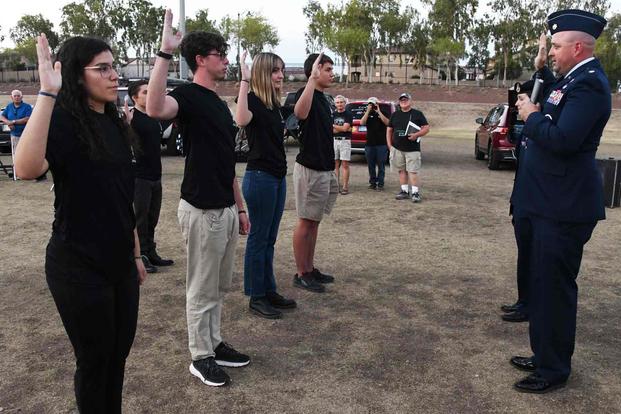The Space Force hopes to offer new Guardians the option of serving the regular eight-year enlistment -- with four years typically spent on active duty and four in the Individual Ready Reserve component -- entirely on active duty, in an effort to retain highly skilled new recruits.
"The Space Force is carefully considering the impact of voluntary extended enlistment contracts and has proposed a third-party study on the impact of this concept," Maj. Tanya Downsworth, a spokesperson for the Air Force, said in an email to Military.com. "Extended enlistment contracts are pre-decisional, and would not be mandatory for new enlistees."
If offered, Downsworth said, six- and eight-year options would be completely voluntary and signed in conjunction with an incentive bonus. No further details as to what that bonus could amount to were given.
Read Next: Vets Say Weight Loss Drugs Have Improved Their Health, But New Patients Are Out of Luck
New Guardians who take the option would not drop into the Individual Ready Reserve status the way most enlisted personnel do -- their ties to the Defense Department would be complete the day they left active duty.
When used in conjunction with the new Space Force Personnel Management Act, which offers active-duty Guardians and Air Force reservists working on space-related missions the option to serve either full time or part time, the move marks the branch's clear goal of retaining its highly skilled workforce.
"When fully implemented, this new construct will allow us to manage our military force more effectively, improve quality of life and retention, and capitalize on skill sets developed outside the military to continue delivering unmatched space capabilities," Downsworth said in a previous statement to Military.com about the availability of a part-time option.
While the service is not facing the same recruiting woes as most of the other branches, it is still by far the smallest and newest component of the U.S. military. It was formally established in 2019 and has only around 8,600 personnel.
Comprised of near-equal numbers of enlisted and officer personnel, the branch hopes to keep the service members it recruited and pulled over from other branches -- mostly from the Army and Air Force -- and wants to grow the number of Guardians by almost 10%, according to the branch's budget request under the 2024 National Defense Authorization Act.
Among other suggested recruitment and retention tactics is a request for nearly $5 million to pay out new bonuses.
In addition to changes made to boost retention, top Air and Space Force officials announced structural changes in early February that they said should better prepare their troops for a potential conflict in the Pacific with China.
The changes include bringing back warrant officers after more than 65 years without them -- a plan first reported by Military.com -- as well as changes to training; renaming and upgrading training and educational systems for Air Force Academy and ROTC cadets; and setting up a new field command called Space Futures Command that would focus, in part, on "experimentation and war games," the Department of the Air Force said.
"We are out of time," Air Force Secretary Frank Kendall said at the Air and Space Forces Association's Warfare Symposium conference earlier this month. "Why do I say that? It's not that I enjoy sounding like a broken record. It's because, for at least two decades, China has been building a military that is designed, purpose-built, to deter and defeat the United States if we intervene in the western Pacific."














